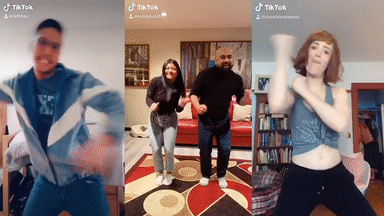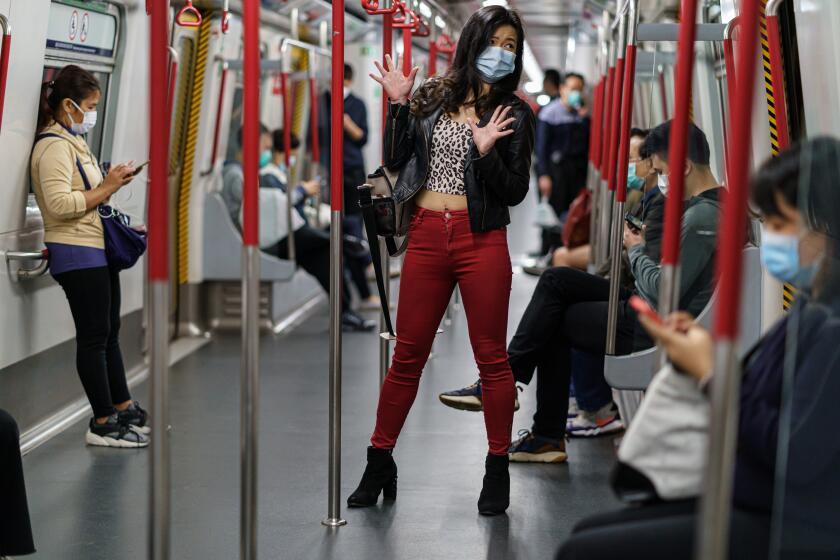The coronavirus pandemic is terrifying — it’s OK to laugh

Singer Chris Mann has created half a dozen parody videos, including this one, “Hello (From the Inside),” a spoof of Adele’s hit, that have attracted more than 60 million views.
- Share via
Did you hear the one about the priest who baptized a baby with a Super Soaker to follow social distancing guidelines?
Or this one: Did you know 2020 is a unique leap year? It has 29 days in February, 300 days in March and 10 years in April.
In the midst of a global pandemic, millions of Americans are finding that laughter is a relief valve as they shelter at home — laughing, mocking and sharing across social media platforms that are bursting with content.
In a montage of quarantine frustrations, a woman irons her toilet paper, puts vodka in the water dispenser and bathes in a tub of Purell, as someone sings: “A little bit of sanitizer in my life …” riffing on “Mambo No. 5.”
Another video features a British family singing the iconic “One Day More” from “Les Miserables” with new lyrics that indicate all is not entirely well in the seemingly traditional household.
TV critic Robert Lloyd combs YouTube, Twitter, Instagram, TikTok, Twitch and more for the best web videos to emerge from the coronavirus crisis.
The videos, memes and jokes are shared tens of millions of times a day with friends, family and co-workers who are literally out of touch, but no longer out of range during the coronavirus outbreak.
In the last few weeks, this lowbrow national comedy show has prompted cultural critics to ask what they always ask in the midst of a national trauma. Is it appropriate? How soon is too soon?
But anyone who has poured through their social media accounts in search of a moment of levity might ask a different question: Why do we keep laughing at simple, crowd-sourced content made in somebody’s bathtub?
“No one is making jokes about the disease,” says Karen North, a clinical professor of digital social media at USC. “People are making jokes about our hugely altered lifestyles.”
As they mock the joys of family togetherness or showcase the inanity of sight gags you once expected to see only in a silent film (check out social media star Ashley Nocera as she falls into a huge pyramid of plastic solo cups), they’re a balm for those of us who are determined to whistle past the graveyard.
“Right now,” North adds, “in an unprecedented way, we all have a shared worldview.”
::
The alpha class clown is TikTok, the user-generated social media platform that launched in the U.S. in 2017. As every 17-year-old knows, the app, which had about 65 million global downloads in March, features snappy, lip-synced videos largely devoid of dialogue.
As the pandemic spread across the nation in mid-March, TikTok quickly became the go-to platform for sharing short videos that spring from the frustration of being locked down with the people you love the most, generating 10.3 billion views on its #HappyAtHome hashtag alone.
Missing your softball or baseball teammates? TikTok videos with the hashtag #virtualcatch show players tossing the ball from player to player, frame to frame, one of them pausing to spray the ball with disinfectant.
Do you like to dance as if no one is watching? Check out the “Savage” dance challenge, set to the Megan Thee Stallion hit song; Tiktok says 9.3 million videos using the song were created last month.
Trying to stay in shape? Watch the video of a woman doing jumping jacks, as the camera zooms out to reveal a standard silver corkscrew doing jumping jacks of its own.
As quarantine and stay-at-home orders trap people indoors, the olds are infiltrating the youth-driven world of the TikTok dance challenge.
A ribald and youthful marketplace, TikTok has also been criticized for security issues and racist content. But lately the standouts are simple and innocent fun, sometimes sent directly from the medical front lines like these emergency room nurses dancing in sync to The Weeknd.
Facebook, Instagram and YouTube have also been mega-players in what has amounted to a national humor fest.
Since the pandemic began, Chris Mann, 37, has created half a dozen humor posts that have scored more than 60 million collective views across YouTube and Facebook, including a parody of Adele, “Hello (From the Inside).”
“I don’t know that I’ve ever been this honest as a creator,” said Mann, a singer who made a name for himself on “The Voice,” and later in touring stage productions such as “Phantom of the Opera.”
“I was bored and frustrated with the loss of audiences, and fearful of what it might do to my career,” he said in a phone interview. “So I just went into the bathroom while my toddler was napping and made a video.”
Four days later, his “My Corona” video had racked up a stunning 20 million views.
“I’ve sung for two presidents,” Mann said. “But I never got the viral presence I got from singing into a roll of toilet paper.”
Recently, he posted a version of “Old Town Road” that mocked a parent’s life without day care. It drew an instant 5 million hits.

Some pop culture moments of the past have proved to be irresistible to producers. Are there countless parodies of the Kinks’ classic song “Lola”? (Did you have to ask?)
Many of the humorous bits are spontaneous, made by the kid down the block or aspiring performers such as Mallory Gillin, 27, and Sarah Mantey, 25, who have posted several coronavirus videos.
“I’ve written song parodies since I was a little kid,” Gillin said. “And I just got bored and did this.”
With deadpan expressions suited to the moment, she and Mantey, her roommate, spoofed the Knack’s “My Sharona,” with a YouTube post called “Why Corona,” a song that “goes out to all the toilet paper hoarders and open-air coughers.”
The unemployed Los Feliz residents said they recorded it in a couple of takes over 15 minutes, followed by a bit of post-production.
Were they concerned with how it might be received amid a global pandemic?

“I did think about it a lot while writing it … to think how people are struggling,” Gillin said by phone. “But I think there will always be a place for comedy. It’s a place for people to come together.”
Compared to the newer platforms, Facebook might seem a musty Morse code — the site where grandma shares her puppy pics. But Facebook remains the gargantuan social media site in the world.
Benedict Nicholson, head of research at NewsWhip, a site that tracks how content does on social networks, filtered Facebook for “ha-ha” reactions to pandemic-related posts.
Comedian Laura Clery came out on top with the three top humor videos in early April, led by “Canceling Everything Is a Dream Come True,” on the hidden perks of coronavirus lockdowns.
It features Clery and her husband dealing with the full range of corona frustrations: mocking their reluctance to leave their house and their decision to order takeout instead (“we’re definitely safest on the couch”) and working from home (“unfortunately, Bill, all my files are at the office. I can’t get any work done today.”).
Are there in-law jokes? Of course.
Him: “I can’t believe my parents had to cancel their flights because of all this.”
Her: “I was really looking forward to them living with us for three weeks.”
“Canceling” drew 46 million views and 440,000 shares.
A coronavirus-themed cover of Natalie Imbruglia’s ‘Torn.’ A Vietnamese Ministry of Health ‘club banger’ about washing hands. A political cartoon commemorating a Wuhan doctor. How the outbreak is fueling artistic expression in the region hit the hardest.
Celebrities have weighed in too. Actor John Krasinski racked up tens of millions of views with his corona-based series “Some Good News,” with celebrity appearances, jokes and, lately, virtual proms.
But celebrities don’t have a lock on this free form, open-mic talent show.
“I put my symptoms into WebMD & it turns out I just have kids,” Lisa Munn, who goes by the name Sarcastic Mommy, tweeted.
“My apartment is starting to resemble Vegas. Dark. No sense of time. Alcohol at all hours,” tweeted Tracy Martin, a Toluca Lake actress/writer at @mstracymartin.
In an email, Martin was a little more philosophical. “Humor is always important in times of crisis and massive stress.... I love a good laugh to distract me.”
::
Since the time of Mark Twain, the comedy axiom has been: “Humor equals tragedy plus time.”
The assassination of President Kennedy was followed by weeks of somber self-reflection. Stand-ups struggled. Comic Mort Sahl went so far as to nearly give up show business to concentrate on political issues, before eventually returning to comedy in the 1970s.
After the Sept. 11, 2001, terrorist attacks, a stunned nation had no idea when it would be acceptable to laugh again, till David Letterman stepped up a week later with a somber monologue, insisting: Life must go on.
“Saturday Night Live” struggled longer with Sept. 11, unable to move forward until almost three weeks later, with an opening that featured firefighters with Mayor Rudolph W. Giuliani and a performance by Paul Simon.
When Simon finished, producer Lorne Michaels joined the mayor onstage.
“Can we be funny?” Michaels asked.
“Why start now?” Giuliani responded, drawing a big therapeutic laugh.
But the 2020 pandemic is different in many ways. Rolling out gradually, it doesn’t share the “where were you?” shock value of an assassination or political attack and seems, at the moment, never ending.
Writing for the Atlantic, Megan Garber notes that time is a “deeply uncertain variable. The new virus is patient. It hides in plain sight. Days, weeks, months, years of this.”
Many schools are closed because of the coronavirus pandemic. Check out The Times’ list of news, resources and more to help parents and children at home.
North notes that the current crisis differs from past traumas in other ways, saying that the world is on the same journey, that we have a common enemy. “Our understanding of what might be a punch line is shared across a broader audience,” she said.
Writer-comedian Jensen Karp, a tough critic of social media, says that history might go easy on the outpouring of humor amid this tragedy.
“I mean, even before the global pandemic I questioned every tweet or Instagram post,” said the wry host of “The No-Sports Report” podcast. “ ‘Why would I post something so stupid?’ is a constant question swirling in my head, especially now that we have no idea what the new normal is.
“But it would appear that people need an escape. I only seem hesitant because I’m such an obsessive downer and would rather just play out every terrible scenario we’re destined to encounter in the future. But don’t be like me. It’s no fun.”
More to Read
Sign up for Essential California
The most important California stories and recommendations in your inbox every morning.
You may occasionally receive promotional content from the Los Angeles Times.











